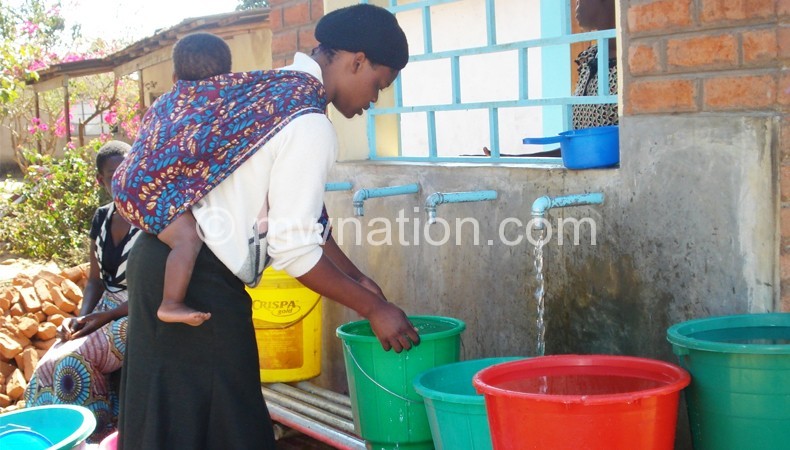Poor management of kiosks affecting service delivery
When Matilda Banda of Machinjiri Township’s Area 6 in Blantyre saw water coming out of a kiosk constructed by Water Users Association (WUA) behind her house, she could not believe it. She thought she was dreaming.
“It was the first time we had tap water in our area. For many years, our main sources of water had been rivers and streams and these are far from my home. I never thought that one day I would have access to clean water from a nearby source,” stresses Banda.

Unfortunately, she says most of the rivers and streams in Area 6 do not survive the summer season and when this happens, it is only South Lunzu River that supplies water to them. The river is about seven kilometres away and according to Banda, most people prefer to draw water at night or early in the morning when the river, which stretches through several villages, is not being used for washing and bathing.
“It is a relief to have a kiosk near my home. We no longer complain of access to clean water except when the taps are dry,” she happily says.
Banda is not the only one happy with the kiosk provided by WUAs.
The community initiative started in Mzuzu in 2008 to help communities have potable water from well-managed sources. Started by Water for People in conjunction with water boards, the initiative has since spread to Lilongwe and Blantyre.
Joseph Magoya, training and capacity building specialist for Water for People, says over time the responsibility has grown big with the addition of the kiosks. Magoya says each of their eight WUAs now manages over 40 kiosk and the figures are determined by the size of the catchment area.
So far, according to Water for People, there are now 678 kiosks planted in the peri-urban areas of Blantyre. The kiosks have created over 800 jobs and are serving about 400 000 people.
“WUA members manage kiosks in their area. They employ people from within to sell water and do maintenance. This is to prepare them to become independent in managing the kiosks without any external support. I am happy to say that the kiosks have largely improved access to safe water in the 21 peri-urban areas of Blantyre and we want this to continue,” says Magoya.
A report by Water for People indicates that the level of service of kiosks in peri-urban areas of Blantyre has increased from 19 percent in 2010 to 60 percent and it predicts a tremendous growth in future.
Like Banda, Virginia Mandanda of Pasani WUA in Lunzu is happy that her area got a kiosk.
“We were abused whenever we went begging for water from people’s homes and factories. Now I’m happy,” she says.
However, just eight months since the founding of Pasani WUA, Mandanda has no kind words for WUAs and water from the kiosk. She says she is back to relying on buying water from private water sources in homes and factories.
“We were told that water sold at Kiosk will be cheaper, but instead it is more expensive than that sold in homes of the privileged,” she says, visibly angry.
Ephrone Mwenitete, Blantyre programmes manager for Water for People, says his organisation, together with leaders of the WUA, lobbied BWB to sell them water on wholesale price to ensure water at kiosk is cheaper. He says official price for 25 and 40 litres of water is K12 and K25 respectively.
However, most kiosks are selling the same amount of water at K15 and K30 respectively. It is worse in Machinjiri WUA where people are buying a 25 litres pail of water at K20.
During an interface meeting between WUAs, BWB and Water for People in Lunzu recently, some of the water users revealed that they stopped buying water from kiosk because it is expensive.
Mwandida Douglas said she stopped buying water from kioks and buys from private homes.
“The water is too expensive and water sellers close the kiosks at will. It is unreliable,” she said.
But both Francis Kampapalala, president of the umbrella body of Blantyre WUAs and Macjones Somba, chairperson of Lunzu Pasani WUA, expressed ignorance of the practice, saying they have fixed prices displayed at each kiosks and the sellers work within the agreed time frame of 6am to 6pm.
But Muthi Nhlema, monitoring and communications specialist for Water for People, admits that there are increased irregularities in WUAs and blames it all on poor management.
“There are problems and if the WUA initiative flops, the reason is internal problems. The source is inside out and not outside in. The leaders were trained and we frequently hold refresher courses,” says Nhlema.
It was established that some kiosks fail to pay water bills while others operate for shorter periods than required time. Some kiosks planted on private land were closed due to disagreements between land owners and WUAs.
Nhlema says: “I was shocked to see that irate beneficiaries removed a water meter for a kiosk,”
Kampapalala agrees that some kiosks are struggling.
“It is because they do not sell much water for various reasons and this affects our payments to employees and bills,” Kampapalala says, adding that they are working on the issues.
Mwenitete believes there is more room for improvement.
The current management, for example, is better than the previous ones and he believes the WUAs can improve with frequent discussions.
He says they introduced interface meetings to ensure there is transparency and that the response has been positive.
“The meetings are forcing WUAs to address problems raised,” he says.
According to Water for People, WUAs have contributed to Malawi’s success in achieving Millennium Development Goals (MDGS) on water whose deadline is 2015.





